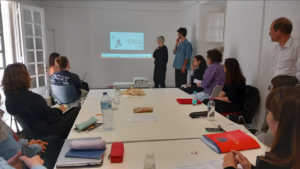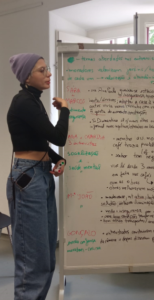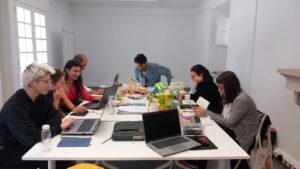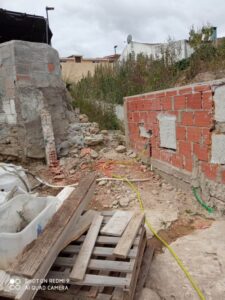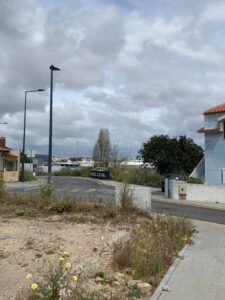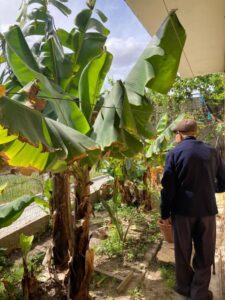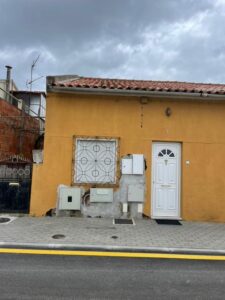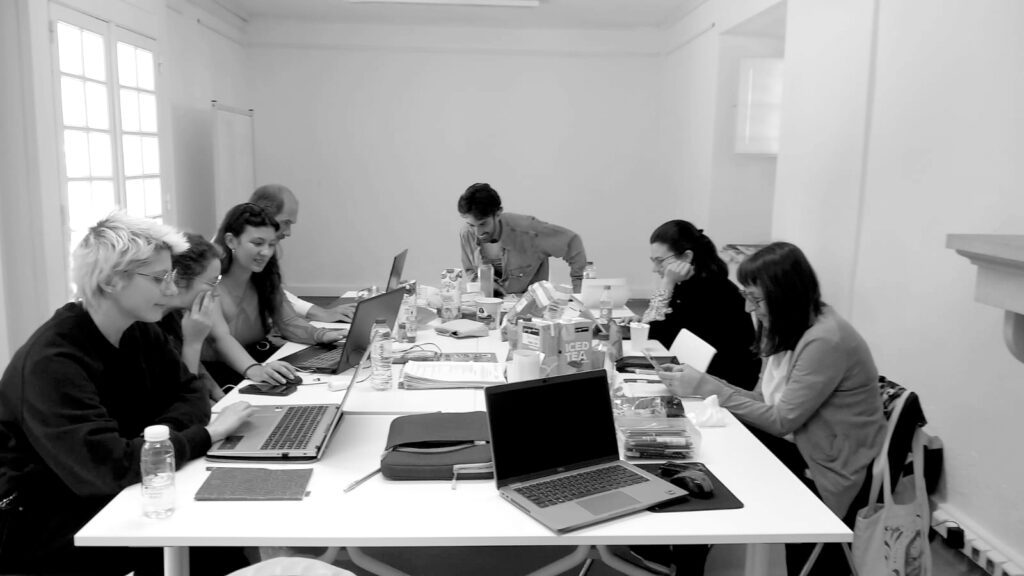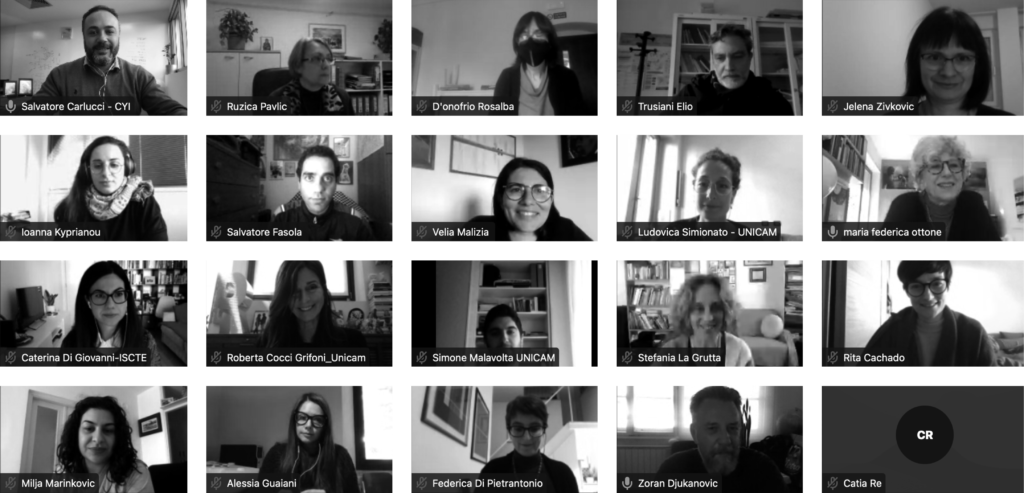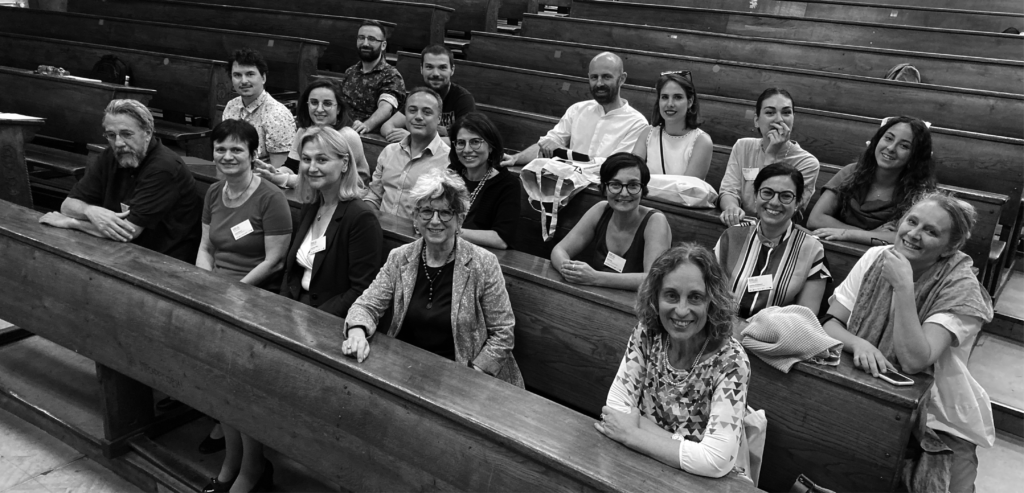What?
Local Workshop “How to make Healthier cities” concentrated on putting in practice the tools concerning the topic “Get to know the neighborhood from above and from within”. The tools were: Walking as a research method; Fieldnotes; Interviewing; Photo Elicitation; 15 minutes proximity. The Local Workshop also implemented a tool called Stone Soup Game, which is, shortly, like “Place Standard with climate lens”, though streamlined version. The idea came from the popular Portuguese myth that named the recipe (Sopa da Pedra). In this game, the facilitators use colored post-its instead of the recipe’s ingredients (orange like carrots, pink like ham, green like cabbage, blue like water, and yellow like olive oil). The participants contribute with “an ingredient”, writing in the post-it the solution they understand as better for a specific local challenge, especially considering climate change. Since the post-its will be mixed, the results won’t be selective in relation to the diverse participants.
These tools were essayed in São João de Brito neighborhood in Alvalade district, Lisbon. São João de Brito neighborhood has approximately 130 households, mostly inhabited by elderly people, who built their own houses. This territory is included in Alvalade district in Lisbon and is located very close to the International Airport. Its residents deal with a high level of noise and air pollution.
The first houses were built in the 1960s, followed by a huge grow in 1976, after the Portuguese revolution in 1974 and the consequent independencies of the African countries which were former Portuguese colonies, which made that thousands of people migrated back to Portugal and had to find places to live. São João de Brito was an almost empty territory where the municipality allowed people to build their houses, but with no guarantee of keeping them. In the 1980s, a Residents’ Association was launched, and from then on, residents fight to maintain the right of place and of housing.
Until 2012, the neighborhood was just below the landing line of airplanes, which was one of the facts that made that the neighborhood’s houses weren’t legalized. From 2012, this landing line was closed, which gave the residents a new hope for maintaining their living place. The noise pollution continued, though, especially because of the nearby airplane parking, with the constant earing of engines working.
Recently, the municipality of Lisbon improved the streets and infrastructures there, but with planning limitations, so the residents would like to see their neighborhood with better sidewalks, better green spaces, more parking conditions, among other revindications, which are being collected by Iscte’s CliCCHE stakeholder “Working with the 99%”, and the Local Workshop also contributed to the assemblage of specificities to be improved. The area where the neighborhood is located is also known for its walkability, a good urban plan, and many facilities, but São João de Brito continues to be somehow segregated, for urban mobility for its residents is scarce, and there are no shops inside.
Where?
The “How to make Healthier cities” Local Workshop took place in Iscte University; São João de Brito neighborhood; and Coruchéus Library, Alvalade district.
In Iscte we worked in the classroom for:
- a presentation of the Workshop program by Rita Cachado;
- an explanation of the Activities and the tools developed by other partners, and a description of the tools to be applied, in two lectures by Caterina Di Giovanni;
- a Keynote delivered by our main Stakeholder “Working with the 99%” Tiago Mota Saraiva, with the title “The Dream of Participation”;
- a presentation of the case study São João de Brito neighborhood, reflecting about “empty spaces” by Ana Catarino, also from our main Stakeholder;
- the students also participated in the lectures shared with the partners on the 8th and 15th May.
In the neighborhood: on the streets; in residents’ houses, when they invited them in; in the Residents’ Association.
In the Coruchéus Library, also in Alvalade district:
- for laboratory activities;
- to share the work done both by the Local Workshop students and by the Librarian readers involved in Lisbon’s CliCCHE activities;
- to present the final work;
- to implement the Stone Soup Game.
When?
This Local Workshop was held during the week of 11-14 April 2023. Differently from other partner universities, Iscte coordination doesn’t have a regular semester of classes to put the Local Workshop in practice. The solution was to find the week during the second semester without classes, after Easter weekend.
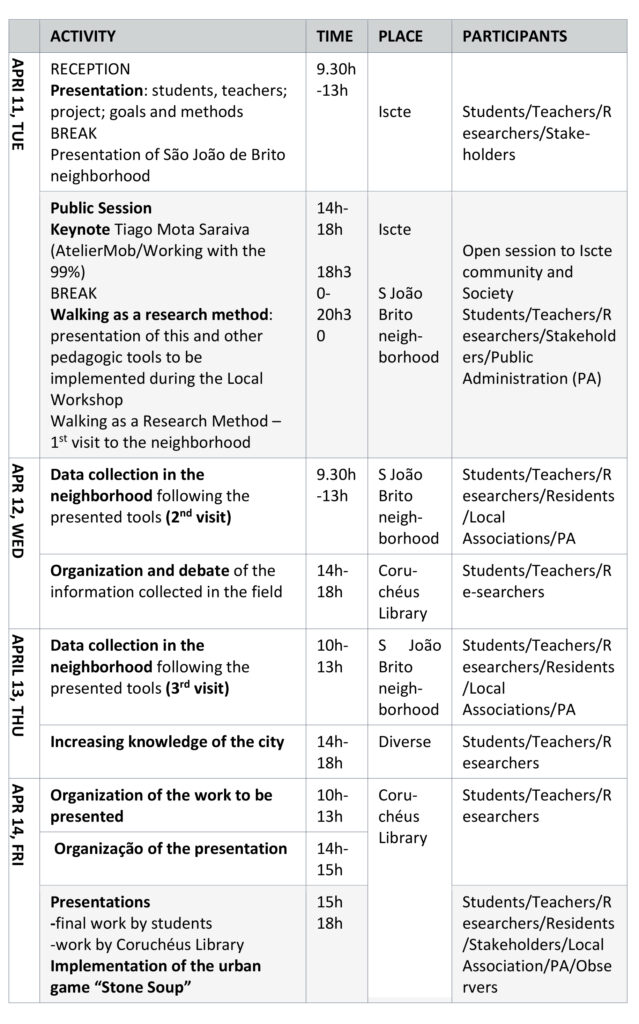
Who?
Teachers (3):
- Rita Cachado, Integrated researcher at Iscte, CIES-Iscte and Invited Assistant Teacher in the Department of Social Research Methods, Iscte;
- Caterina Di Giovanni, PhD in Urban Studies, Researcher in CIES;
- Teresa Madeira da Silva, Director of the Department of Architecture, Iscte, and researcher in Dinamia, Iscte
Students (6):
- Ana Nunes dos Santos, Graduated in Spatial Planning, Student of a Master Course in Urban Studies in Iscte/NOVA;
- Marcos Figueiredo, Graduation in Industrial Design and currently a student of PhD in Architecture of Metropolitan Territories;
- Matilde Richa, also a Student of the same Master Course in Urban Studies, Iscte/NOVA;
- Gonçalo Golaio, with a Graduation in Ladscape Architecture and currently a student of the Master in Sociology, Iscte;
- Maria João Freitas Rodrigues, with a Graduation in Geography, and working in Hospital Administration, is a PhD student in Urban Studies;
- Sara Teixeira, Finalist of the Graduation in Architecture Iscte.
Stakeholders/Public Administration (4 institutions, 9 people):
- AtelierMob/Working with the 99%: Tiago Mota Saraiva, Architect, and Ana Catarino, Anthropologist;
- Coruchéus Library, Alvalade District and its project Lives and Memories (from Lisbon Municipality): Elisabete Santa-Bárbara, Cláudia Moreira, Ana Santos, Fernanda Santos and Sílvia Neves;
- Zero Association: Susana Militão;
- Associação de Moradores do Bairro São João de Brito: Maria de Fátima Martins and other members of the Board and residentes (although we have statements agreeing with including their names in the project, the fact that the neighborhood is yet to be completely regulated, led us to leave out their names from the project website).
Observers (3):
- Marta Santos (MA Student of Urban Studies);
- Elsa Pegado (member of the Board of CIES, Iscte);
- Marluci Menezes (Researcher at LNEC).
Results:
The Local Workshop was built from scratch. A call for students was launched in February 2023 addressed to all MA and PhD Students, but especially divulged to MA and PhD programs of environment, architecture, urban planning, international studies, and social sciences. A total of eleven students applied and were approved into the “How to Make Healthier Places?” Local Workshop. Six attended the whole week, one more were included in part of the activities.
Students:
- Had a brief presentation about the various activities of CliCCHE training methodology for urban regeneration and were invited to make autonomous work to learn about all activities;
- Learned about 4.2. activity and its tools;
- Experimented the knowledge acquired about the tools in the field with the active participation of residents;
- Debated the collected data with stakeholders and public administration members;
- Organized the collected data;
- Produced a final presentation of the findings.
Activities and Tools:
Activities 4.1., 4.4., 4.5. and 4.6. were acknowledged by students through a brief lecture and autonomous work, which consisted in delivering materials from teachers to students, as the e-learning products developed in the R2 methodolog.
Activity 4.2.
- Lecture on mapping; debate about expectations of residents on participatory projects; lecture about the 4.2. tools.
- Tools Used: Walking as a Research Method; Fieldnotes; Interviewing; 15 Minutes Proximity
- Outputs: Fieldnotes indexation; Photos organization
- Major result: Final presentation to other participants (teachers, stakeholders, observers).
Activity 4.3. Dissemination of the questionnaire “Risk pErcepTion and willingnEss to pay on Climate change (RETEACH) questionnaire to citizens (before and during workshop activities, applied by Teachers and students).
Urban Game “Stone Soup” (activities 4.1. 4.2. 4.3.), where all participants were invited to reflect about the improvement of the neighborhood conditions, including: climate change adaptation, urban heath, considerations on green spaces, urban (re)planning, pollution and its solutions.
Activity 4.7. Communication and dissemination of the project in all phases: in the context of the Local Workshop, the project was disclosed through:
- The Call for Students in February-March;
- A poster for the Public Session of April 11 in Iscte: Agenda, Cominvestigar, CIES Research Center and Social Media, Teachers social media. The Public Session was also disclosed by Stakeholders and Residents
- The program of the Local Workshop to all participants by email;
- Report of some activities in Social Media by Teachers and in CIES Newsletter by CIES staff;
- Lectures on May 8th and 15th were disclosed in Iscte agenda and CIES website.
The short time dedicated to the Local Workshop didn’t allow to have a proposition result such as, for instance, an urban planning solution to the problems identified in the neighborhood, but the implementation of the urban game “Stone Soup” granted a participation of all people included in the Workshop, with no hierarchies, and everybody presented ideas. The Local Workshop contributed to an integrated and interactive participation of local entities and residents which doesn’t end with the Workshop. In fact, other activities are planned, such as a compromise to make improvement specifications, considering the urban plan intervention executed recently by the municipality.
